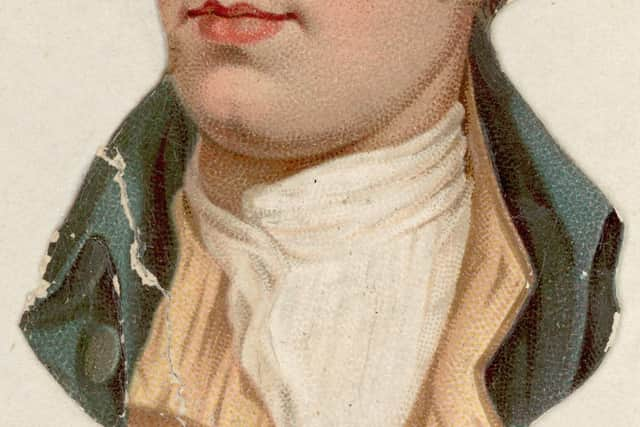Burns Night 2022: Robert Burns advised not to write in Scots language in case London readers could not understand
and live on Freeview channel 276
A project by academics at the University of Glasgow’s Centre for Robert Burns Studies looked at letters to and from Scotland’s national bard.
The team looked at some 800 letters written by Burns and around 300 to 400 letters from his friends and admirers – and have put together both sides of the letter correspondence where available.
Advertisement
Hide AdAdvertisement
Hide AdThey found that Dr John Moore advised the poet not to write in Scots, warning that London readers would not connect with it, though Burns ignored his suggestion.
Dr Rhona Brown, a senior lecturer in Scottish Literature at the university’s Centre for Robert Burns Studies, said: “In the correspondence, we get closer to Burns ‘the man’ than anywhere else: his letters reveal his triumphs, failures, anxieties, fears and joys.
“Our edition of the correspondence is also presenting, for the first time, letters written to Burns as well as by Burns, allowing us to reconstruct personal dialogues from throughout Burns’s life.
“Two of Burns’s relationships stand out – with Dr John Moore and Mrs Frances Dunlop – as we have both sides of the correspondence.


Advertisement
Hide AdAdvertisement
Hide Ad“What is fascinating, for example, is that early on, Moore advised Burns not to write in Scots. He cautioned Burns that he was limiting his audience and felt that London readers wouldn’t understand or connect with the Scots language. Dunlop advised him to avoid political subjects.
“But Burns is his own man and ignores the advice and carries on regardless. I think history has now shown that he was right.”
People around the globe will celebrate Burns Night on January 25 to celebrate the anniversary of the poet’s birth on that date in 1759.
The correspondence will be published as part of the new Collected Works of Robert Burns published by the Oxford University Press.
Advertisement
Hide AdAdvertisement
Hide AdThe new edition’s publication of responses to the poet’s letters also reveals that reactions to his works were not always what people might expect.
Dr Craig Lamont, a research associate in Robert Burns Studies at the University of Glasgow, said: “Burns sends Dr John Moore a long, heartfelt letter giving a detailed account of his childhood and life up to 1787: this letter is now known as Burns’s autobiographical letter.
“In response, Moore asks Burns to ‘divide your letters when they are so heavy’, because ‘I was obliged to pay six & eightpence for it’.”
Advertisement
Hide AdAdvertisement
Hide AdThe Centre will also host an online question and answer session on Thursday January 20 so that members of the public and Burns scholars can find out more about the project, with more information available via @GlasgowBurns.
A message from the Editor:
Thank you for reading this article. We're more reliant on your support than ever as the shift in consumer habits brought about by Coronavirus impacts our advertisers.
If you haven't already, please consider supporting our trusted, fact-checked journalism by taking out a digital subscription.
Comment Guidelines
National World encourages reader discussion on our stories. User feedback, insights and back-and-forth exchanges add a rich layer of context to reporting. Please review our Community Guidelines before commenting.
